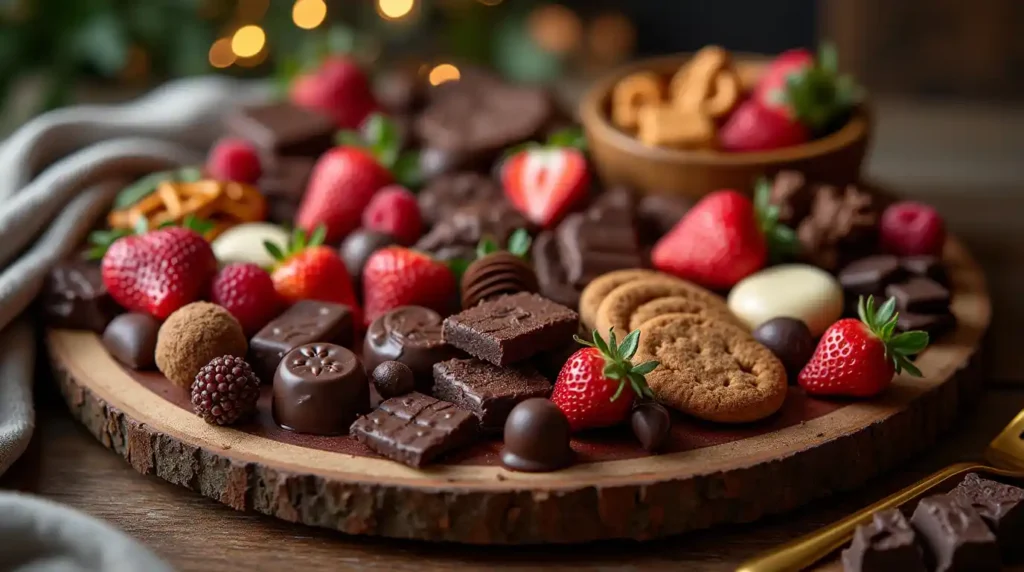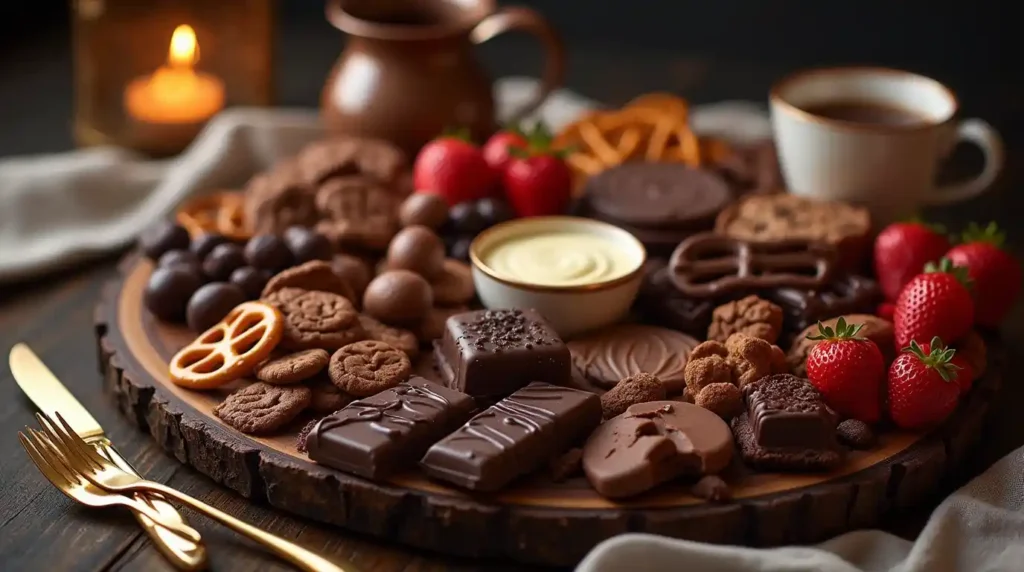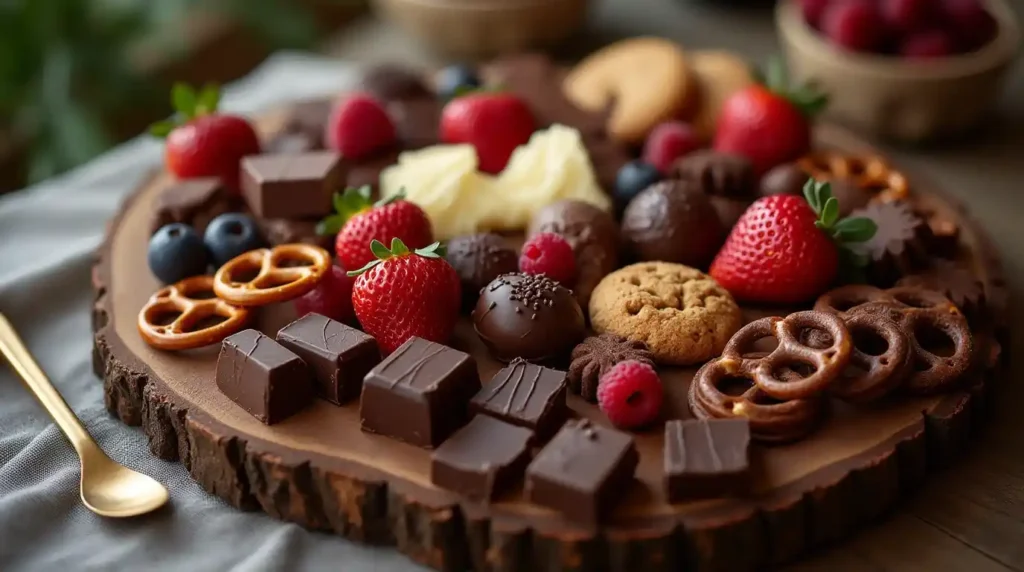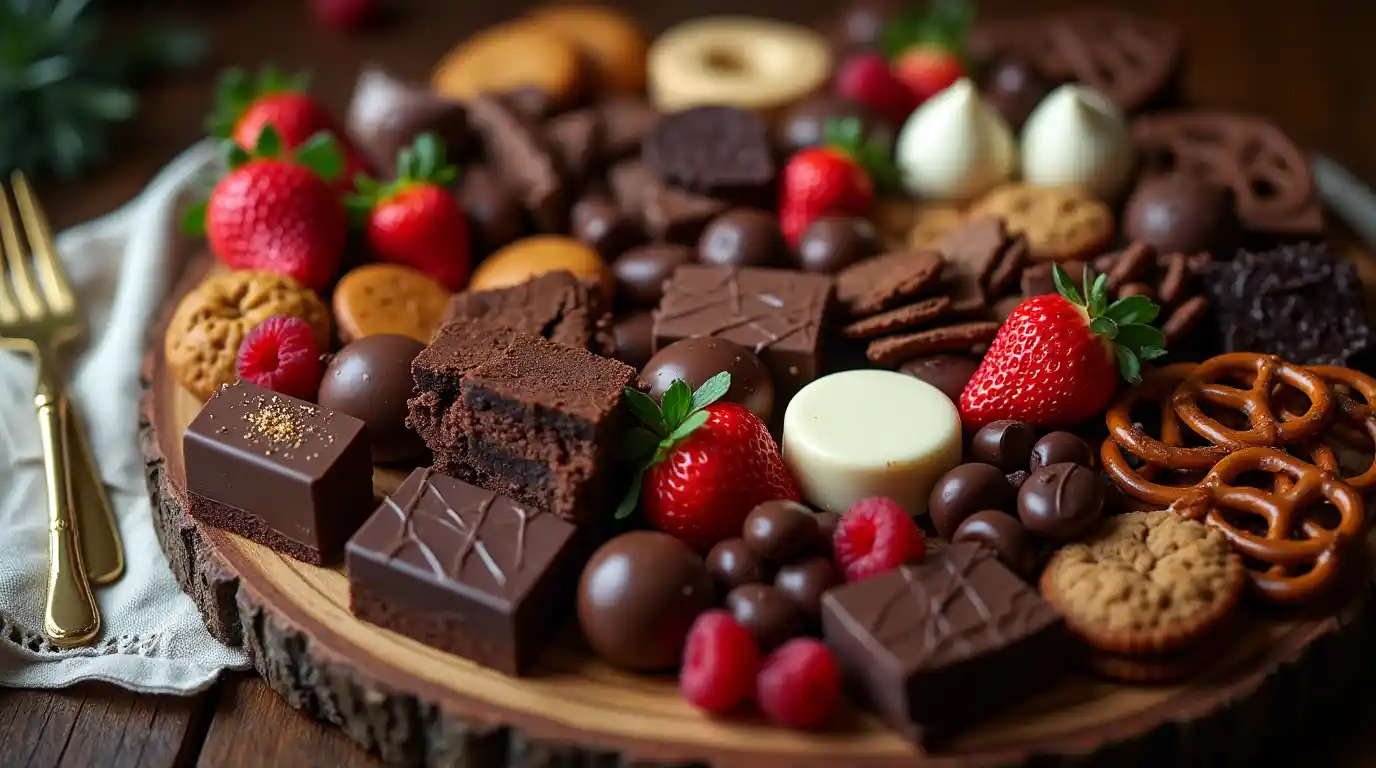Table of Contents
If you’re looking for a visually stunning, crowd-pleasing dessert that’s easy to assemble and endlessly customizable, a chocolate charcuterie board is your answer. Perfect for holidays, date nights, parties, or a cozy movie night in, these sweet boards are a modern twist on the classic savory spread. With the right mix of chocolate, fruits, nuts, and dips, you can create a decadent display that’s as delightful to eat as it is to look at.
In this guide, we’ll break down everything you need to know to build the ultimate chocolate charcuterie board, from ingredient ideas to styling tips. We’ll also include inspiration for themed boards, beverage pairings, and dietary-friendly options. For additional inspiration, check out these 5 delicious chocolate charcuterie boards that highlight creative pairings and presentation styles.
Looking for a step-by-step visual walkthrough? This guide to assembling a chocolate charcuterie board offers practical tips and ingredient suggestions to get you started.
What Is a Chocolate Charcuterie Board?

A chocolate charcuterie board is a sweet take on the traditional meat-and-cheese platter. Instead of salami and cheddar, you’ll find an array of chocolates, fruits, cookies, nuts, and dessert dips. The concept stems from the popularity of grazing boards and offers a dessert-forward option that’s both elegant and fun.
Unlike savory boards, chocolate versions focus on balancing sweet, bitter, and fruity flavors while offering a variety of textures like crunchy, smooth, and chewy. It’s also a great way to showcase gourmet or artisanal chocolates in a visually compelling format.
Essential Ingredients for the Perfect Board
Here’s a breakdown of popular components to include:
Chocolates
- Dark chocolate squares or truffles
- Milk chocolate bars or pieces
- White chocolate bark or dipped treats
- Ruby chocolate for color variety
- Flavored chocolate (e.g., chili, sea salt, mint)
Fruits
- Fresh strawberries, raspberries, blueberries
- Dried apricots, mango, or cherries
- Banana chips or candied citrus slices
Cookies and Biscuits
- Chocolate chip cookies
- Biscotti
- Wafers and rolled Pirouettes
- Mini brownies or brownie bites
Nuts and Pretzels
- Chocolate-covered almonds or peanuts
- Caramelized pecans
- Mini pretzels or pretzel rods
Dips and Sauces
- Chocolate fondue
- Nutella or hazelnut spread
- Caramel or peanut butter dips
- Marshmallow cream or whipped ganache

Choosing the Right Board and Presentation Style
When it comes to presentation, the board itself sets the tone. Choose from:
- Wooden boards for a rustic feel
- Marble slabs for a sleek, upscale look
- Slate trays for contrast and texture
Use small ramekins or bowls for messy items like dips or loose nuts. For a layered look, arrange items by type and color. Create focal points using stacked chocolates or a large bowl of fondue in the center. Garnish with fresh mint, edible flowers, or gold leaf for added elegance.
How to Assemble Your Chocolate Charcuterie Board
Follow these steps to build a balanced and beautiful board:
- Choose a theme – romantic, seasonal, or color-coordinated
- Start with bowls – place dips and messy items first
- Add large items – anchor the board with chocolate bars and fruit clusters
- Fill in the gaps – add cookies, nuts, pretzels, and smaller chocolates
- Layer and stack – use height and overlapping textures for visual interest
- Balance flavors – include both sweet and slightly salty elements
Pro tip: Don’t overfill the board. Leave a bit of negative space to make each item shine.
Themed Chocolate Charcuterie Boards for Special Occasions

Tailor your board to suit the season or celebration. Here are a few ideas:
Holiday Boards
- Valentine’s Day: Heart-shaped chocolates, strawberries, pink and red accents
- Christmas: Peppermint bark, gingerbread cookies, green and red candy
- Easter: Pastel chocolates, marshmallow chicks, candy eggs
Seasonal Boards
- Summer: Fresh berries, tropical dried fruits, citrus-dusted chocolate
- Autumn: Caramel apples, cinnamon bark, spiced nuts
Event-Themed Boards
- Birthdays: Personalized treats, cake pops, number-shaped chocolates
- Baby Showers: White chocolate, pastel-colored candies, soft cookies
Beverage Pairings That Complement Chocolate
Pairing beverages can elevate your chocolate charcuterie board into a luxurious tasting experience. Consider:
Wines
- Red wine like Merlot or Zinfandel with dark chocolate
- Sparkling wine or Moscato with white or milk chocolate
- Dessert wines like Port for rich chocolate truffles
Non-Alcoholic Options
- Coffee or espresso with bittersweet chocolates
- Chai tea with spiced cookies
- Hot chocolate for a double chocolate experience
Dietary Alternatives and Modifications
For inclusive entertaining, consider these dietary swaps:
- Vegan: Use dairy-free chocolate, vegan marshmallows, plant-based dips
- Gluten-Free: Choose certified gluten-free cookies and pretzels
- Nut-Free: Avoid nut-based chocolates and opt for seeds or coconut flakes
Label these options clearly if you’re serving a crowd.
FAQs About Chocolate Charcuterie Boards
What do you put on a chocolate charcuterie board?
To build a well-balanced chocolate charcuterie board, include a mix of textures and flavors:
- Chocolates: dark, milk, white, ruby, and flavored varieties
- Fruits: strawberries, raspberries, dried apricots, bananas
- Cookies/Biscuits: biscotti, wafers, chocolate chip cookies
- Nuts: chocolate-covered almonds, caramelized pecans
- Dips: chocolate fondue, peanut butter, caramel sauce
- Extras: marshmallows, toffee, coconut flakes
What is the 3-3-3-3 rule for a charcuterie board?
The 3-3-3-3 rule ensures a balanced spread:
- 3 meats
- 3 cheeses
- 3 starches (bread, crackers, pretzels)
- 3 accompaniments (fruit, nuts, dips)
For a dessert board, swap meats and cheeses for different types of chocolate and sweets.
What not to put on a charcuterie board?
Avoid items that are:
- Messy or drippy without containers
- Perishable or quick to melt (like ice cream)
- Overpowering in flavor or smell
- Sticky and difficult to handle
What cheese pairs well with chocolate?
Cheeses that pair beautifully with chocolate:
- Brie: creamy and mild, great with dark chocolate
- Goat cheese: tangy and smooth
- Mascarpone: light and sweet
- Aged cheddar: sharp, contrasts milk chocolate
What are 3 cheeses for a charcuterie board?
Choose one from each category for balance:
- Soft: Brie or Camembert
- Semi-soft: Gouda or Havarti
- Hard: Aged Manchego or Parmesan
What are 5 tips to making a charcuterie board?
- Start with your centerpiece (dips or bowls)
- Balance textures and colors
- Use small bowls for loose or sticky items
- Layer items to create height and depth
- Choose seasonal or theme-appropriate ingredients
What kind of bread goes on a charcuterie board?
Best bread options:
- Baguette slices (plain or toasted)
- Crostini
- Crackers
- Sweet breads (banana bread, cinnamon loaf)
What jam goes on a charcuterie board?
Top jams and spreads include:
- Fig jam
- Raspberry preserves
- Apricot jam
- Cherry compote
How to fold prosciutto for a charcuterie board?
Ways to fold prosciutto:
- Rosettes: roll into a flower shape
- Ribbons: fold lengthwise and twist
- Fans: layer pieces in a spread-out design
How to cut brie for charcuterie?
To serve brie:
- Cut into thin wedges like a pie
- Keep the rind on
- Let it come to room temperature before serving
What meat goes well with prosciutto?
Complementary meats:
- Salami
- Capicola
- Soppressata
- Bresaola
What type of melon with prosciutto?
Best melons to pair:
- Cantaloupe
- Honeydew
- Watermelon
What are the best crackers for charcuterie?
Ideal cracker choices:
- Water crackers
- Whole grain crackers
- Seeded crisps
- Thin wafer crackers
What kind of nuts do you put on a charcuterie board?
Top nut options:
- Almonds (plain or chocolate-covered)
- Pecans (candied or spiced)
- Walnuts (raw or honey-glazed)
- Macadamias
How do you organize a charcuterie board for beginners?
- Pick a theme (savory, sweet, mixed)
- Use the 3-3-3-3 rule for balance
- Place bowls and large items first
- Build around them with chocolates, fruits, or cheeses
- Fill in gaps with small snacks and garnishes
- Keep contrasting flavors and textures throughout
Final Thoughts
Creating a chocolate charcuterie board is more than just arranging treats—it’s about crafting a sensory experience that brings people together. From the rich, velvety texture of dark chocolate to the bright burst of fresh berries, each bite offers a unique flavor and texture. With its flexibility and visual appeal, this dessert board can easily be tailored for any occasion—whether you’re hosting a large holiday party, an intimate date night, or a casual get-together with friends.
One of the greatest benefits of a chocolate charcuterie board is its versatility. You can go simple with a few high-quality chocolates and fruits, or go all-out with themed decorations, gourmet cookies, dips, and decorative garnishes. It’s also incredibly inclusive—whether your guests are vegan, gluten-free, or have nut allergies, it’s easy to make thoughtful substitutions without sacrificing flavor or presentation.
Presentation is key. Think about contrast in color, shapes, and sizes. Layer pieces in a way that draws the eye, and don’t be afraid to add small decorative elements like edible flowers, herbs, or gold leaf to enhance the visual impact.
Most importantly, have fun with it. There’s no wrong way to build a chocolate charcuterie board—it’s about creativity, indulgence, and delighting the senses. Use the ideas in this guide as a starting point, and then make it your own. Experiment with different pairings, seasonal ingredients, or personal favorites. The more you play with flavors and layout, the more memorable and delicious the result will be.
Easy Allrecipes
1- Peach and Blueberry Crisp-Sweet & Crunchy Fruit Dessert Recipe
2- How to Make Ninja Creami Protein Ice Cream: Best Recipes & Tips
3- Dolly Parton’s Butterscotch Pie A Southern Classic with Caramel Flavor
4- Chocolate Ganache Cake – Ultimate Recipe for a Rich & Decadent Dessert
5- Princess Cake (Prinsesstårta) – The Ultimate Guide to Sweden’s Iconic Dessert
6- Zebra Cakes: A Deliciously Nostalgic Treat You’ll Love
7- 10 Best Bluey Cake Topper Magic Ideas – The Ultimate Guide for a Perfect Party
8- 10 Irresistible Facts About Starbucks Cake Pops: Flavors, Prices & Recipe
9- Chocolate Stout Cake – The Ultimate Rich & Moist Dessert Recipe
10- How to Make a Spiderman Cake – Easy DIY Recipe & Decoration Tips

